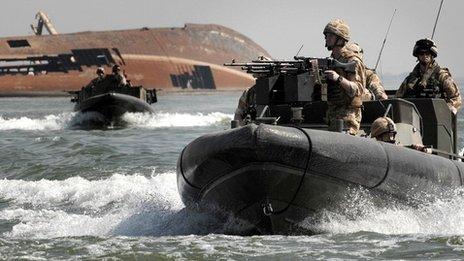Iraq inquiry: Straw says regime change 'never' UK plan
- Published
Jack Straw: 'I was naive to think Saddam would comply with UN'
Jack Straw has insisted that regime change in Iraq was "never" UK policy even though some within government may have wanted Saddam Hussein removed.
The former foreign secretary told the Iraq inquiry such a goal, in itself, would have been "palpably illegal".
In the last public hearing, he said the invasion was justified but he expressed "deep sorrow" for those who had died.
Inquiry chairman Sir John Chilcot said it would take "some months" to complete the report but did not set a deadline.
While Mr Straw's third appearance was the last to take place in public, the inquiry plans to hold a small number of further private sessions and take written evidence, including from current and former MPs.
The inquiry has been seeking to establish when the UK committed itself to military action and why its efforts to find a diplomatic solution to the crisis in early 2003 failed.
As the UK considered how to deal with Iraq and escalating US demands for action during 2002, Mr Straw said he "categorically" told Mr Blair that regime change, as an end in itself, was clearly unlawful.
"You could have the wish and desire to see regime change and within clear limits wanted to encourage that. But it could not be and was not an objective of British government policy," he said.
Momentum towards dealing with Iraq began in January 2002, Mr Straw said, when President George Bush included Iraq in a list of countries that he described as an "axis of evil".
"I could sense the game change that his statement led to," Mr Straw said, adding that he told Mr Blair of his reservations about the comments.
Although he had a "difference of emphasis" with Mr Blair about how to proceed against Iraq, he said he was "on the same page" as the prime minister in trying to get Iraq to comply through the UN.
If Saddam agreed to co-operate and disarm, he believed the invasion would not have happened and Saddam would have "stayed in post".
"There would have been no possibility of the UK being involved in military action, at all, and I do not think that even if President Bush had been ill-advised enough to want to go to war, he would have done so.
"What would have been the cause of war in those circumstances?"
Military discussions
The former foreign secretary is one of a handful of senior figures, including Mr Blair, who were recalled to help the committee "fill gaps" in the evidence and clarify outstanding points.
Mr Straw was asked if he saw any of the private correspondence between Mr Blair and President Bush in the run-up to the war. Despite the inquiry's requests, this is not being published for national security reasons.
He said he saw some of Mr Blair's notes before he sent them and some afterwards, adding that the prime minister "took his own advice" when it came to their contents.
Questioned about how thoroughly Cabinet discussed Iraq, Mr Straw said Mr Blair was worried about leaks after details of a meeting in March 2002 quickly ended up in the press.
As a result, he said the approach to discussing military options was "we have to keep matters pretty tight".
But he said ministers would have had to be "deaf, dumb and blind" not to realise by the autumn of 2002 that military action and planning was under way.
Report publication
In his first appearance in January 2010, Mr Straw said supporting the war had been the most "difficult decision" of his career but he believed action was justified due to the threat posed by Iraq.
He has admitted he ignored the views of a number of senior Foreign Office lawyers who advised the action was unlawful - preferring to rely on the advice of Attorney General Lord Goldsmith who eventually took the contrary view.
Mr Straw's session brings down the curtain on more than 100 public hearings which began in November 2009.
Inquiry chairman Sir John Chilcot said it would now begin "the significant task" of writing the report, stressing that the findings must "do justice" to all the evidence that it had received.
He refused to set what he said would be an "artificial deadline" for publishing the report but said that the committee hoped to do it as soon as possible.
- Published5 July 2016

- Published25 January 2011